Deck 15: Benzene and Aromatic Compounds
Question
Question
Question
Question
Question
Question
Question
Question
Question
Question
Question
Question
Question
Question
Question
Question
Question
Question
Question
Question
Question
Question
Question
Question
Question
Question
Question
Question
Question
Question
Question
Question
Question
Question
Question
Question
Question
Question
Question
Question
Question
Question
Question
Question
Question
Question
Question

Unlock Deck
Sign up to unlock the cards in this deck!
Unlock Deck
Unlock Deck
1/47
Play
Full screen (f)
Deck 15: Benzene and Aromatic Compounds
1
Which of the following statements about benzene is true?
A)Benzene is a saturated hydrocarbon.
B)Benzene undergoes addition reactions.
C)Benzene has five degrees of unsaturation.
D)Benzene undergoes substitution reactions.
A)Benzene is a saturated hydrocarbon.
B)Benzene undergoes addition reactions.
C)Benzene has five degrees of unsaturation.
D)Benzene undergoes substitution reactions.
Benzene undergoes substitution reactions.
2
What is the correct assignment of the names of the following fused aromatic compounds? ![<strong>What is the correct assignment of the names of the following fused aromatic compounds? </strong> A)I = naphthalene; II = anthracene; III = phenanthrene B)I = naphthalene; II = phenanthrene; III = anthracene C)I = naphthalene; II = phenanthrene; III = benzo[a]pyrene D)I = anthracene; II = naphthalene; III = phenanthrene](https://d2lvgg3v3hfg70.cloudfront.net/TB7662/11eac43c_f7c0_c990_a9af_d5fba3396182_TB7662_00.jpg)
A)I = naphthalene; II = anthracene; III = phenanthrene
B)I = naphthalene; II = phenanthrene; III = anthracene
C)I = naphthalene; II = phenanthrene; III = benzo[a]pyrene
D)I = anthracene; II = naphthalene; III = phenanthrene
![<strong>What is the correct assignment of the names of the following fused aromatic compounds? </strong> A)I = naphthalene; II = anthracene; III = phenanthrene B)I = naphthalene; II = phenanthrene; III = anthracene C)I = naphthalene; II = phenanthrene; III = benzo[a]pyrene D)I = anthracene; II = naphthalene; III = phenanthrene](https://d2lvgg3v3hfg70.cloudfront.net/TB7662/11eac43c_f7c0_c990_a9af_d5fba3396182_TB7662_00.jpg)
A)I = naphthalene; II = anthracene; III = phenanthrene
B)I = naphthalene; II = phenanthrene; III = anthracene
C)I = naphthalene; II = phenanthrene; III = benzo[a]pyrene
D)I = anthracene; II = naphthalene; III = phenanthrene
I = naphthalene; II = anthracene; III = phenanthrene
3
What is the correct assignment of the names of the following substituted benzenes? 
A)I = Phenol; II = anisole; III = toluene
B)I = Benzaldehyde; II = phenol; III = anisole
C)I = Benzaldehyde; II = phenol; III = toluene
D)I = Phenol; II = anisole; III = styrene

A)I = Phenol; II = anisole; III = toluene
B)I = Benzaldehyde; II = phenol; III = anisole
C)I = Benzaldehyde; II = phenol; III = toluene
D)I = Phenol; II = anisole; III = styrene
I = Benzaldehyde; II = phenol; III = toluene
4
What is the correct assignment of the names of the following substituted benzenes? 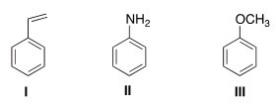
A)I = Styrene; II = aniline; III = anisole
B)I = Toluene; II = anisole; III = styrene
C)I = Styrene; II = anisole; III = phenol
D)I = Toluene; II = aniline; III = anisole

A)I = Styrene; II = aniline; III = anisole
B)I = Toluene; II = anisole; III = styrene
C)I = Styrene; II = anisole; III = phenol
D)I = Toluene; II = aniline; III = anisole

Unlock Deck
Unlock for access to all 47 flashcards in this deck.
Unlock Deck
k this deck
5
What is the IUPAC name of the following compound? 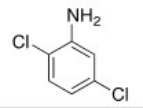
A)3,6-Dichloroaniline
B)2,5-Dichloroaniline
C)2,5-Dichloroaminobenzene
D)2,5-Dichloroanisole

A)3,6-Dichloroaniline
B)2,5-Dichloroaniline
C)2,5-Dichloroaminobenzene
D)2,5-Dichloroanisole

Unlock Deck
Unlock for access to all 47 flashcards in this deck.
Unlock Deck
k this deck
6
What orbitals are used to form the bond indicated in the following molecule? 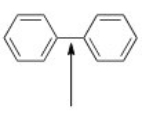
A)Csp2¾Csp2
B)Csp2¾ C2p
C)C2p¾C2p
D)Csp3¾Csp3

A)Csp2¾Csp2
B)Csp2¾ C2p
C)C2p¾C2p
D)Csp3¾Csp3

Unlock Deck
Unlock for access to all 47 flashcards in this deck.
Unlock Deck
k this deck
7
What is the IUPAC name of the following compound? 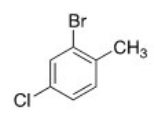
A)3-Bromo-1-chloro-4-toluene
B)2-Bromo-4-chlorotoluene
C)4-Chloro-2-bromo-1-toluene
D)2-Bromo-4-chloroanisole

A)3-Bromo-1-chloro-4-toluene
B)2-Bromo-4-chlorotoluene
C)4-Chloro-2-bromo-1-toluene
D)2-Bromo-4-chloroanisole

Unlock Deck
Unlock for access to all 47 flashcards in this deck.
Unlock Deck
k this deck
8
Which of the following molecules has the most acidic hydrogen atoms? 
A)I
B)II
C)III
D)IV

A)I
B)II
C)III
D)IV

Unlock Deck
Unlock for access to all 47 flashcards in this deck.
Unlock Deck
k this deck
9
Rank the following compounds in order of decreasing acidity,starting with the most acidic. 
A)I > II > III
B)III > II > I
C)III > I > II
D)I > III > II

A)I > II > III
B)III > II > I
C)III > I > II
D)I > III > II

Unlock Deck
Unlock for access to all 47 flashcards in this deck.
Unlock Deck
k this deck
10
What is the correct assignment of the number of signals in the 13C NMR spectra of the following disubstituted benzene derivatives? 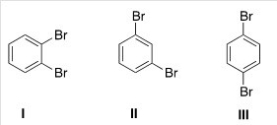
A)I = 3 signals; II = 3 signals; III = 2 signals
B)I = 3 signals; II = 4 signals; III = 2 signals
C)I = 6 signals; II = 6 signals; III = 6 signals
D)I = 3 signals; II = 4 signals; III = 3 signals

A)I = 3 signals; II = 3 signals; III = 2 signals
B)I = 3 signals; II = 4 signals; III = 2 signals
C)I = 6 signals; II = 6 signals; III = 6 signals
D)I = 3 signals; II = 4 signals; III = 3 signals

Unlock Deck
Unlock for access to all 47 flashcards in this deck.
Unlock Deck
k this deck
11
What is the IUPAC name of the following compound? 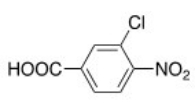
A)2-Nitro-5-carboxychlorobenzene
B)2-Chloro-4-carboxynitrobenzene
C)2-Chloro-1-nitro-4-benzoic acid
D)3-Chloro-4-nitrobenzoic acid

A)2-Nitro-5-carboxychlorobenzene
B)2-Chloro-4-carboxynitrobenzene
C)2-Chloro-1-nitro-4-benzoic acid
D)3-Chloro-4-nitrobenzoic acid

Unlock Deck
Unlock for access to all 47 flashcards in this deck.
Unlock Deck
k this deck
12
What is the structure of a compound of molecular formula C10H14O2 that shows a strong IR absorption at 3150 ¾2850 cm-1 and gives the following 1H NMR absorptions: 1.4 (triplet,6H); 4.0 (quartet,4H); and 6.8 (singlet,4H)ppm? 
A)I
B)II
C)III
D)IV

A)I
B)II
C)III
D)IV

Unlock Deck
Unlock for access to all 47 flashcards in this deck.
Unlock Deck
k this deck
13
How many 13CNMR signals does the following compound exhibit? 
A)4
B)5
C)6
D)8

A)4
B)5
C)6
D)8

Unlock Deck
Unlock for access to all 47 flashcards in this deck.
Unlock Deck
k this deck
14
Which of the following statements about the structure of benzene is not true?
A)Benzene is planar.
B)Benzene has three short double bonds alternating with three longer single bonds.
C)The electrons in the pi bonds are delocalized around the ring.
D)Benzene has six pi electrons.
A)Benzene is planar.
B)Benzene has three short double bonds alternating with three longer single bonds.
C)The electrons in the pi bonds are delocalized around the ring.
D)Benzene has six pi electrons.

Unlock Deck
Unlock for access to all 47 flashcards in this deck.
Unlock Deck
k this deck
15
Which of the following is not a criterion for antiaromaticity?
A)The molecule must be cyclic.
B)The molecule must have (4n + 2)pi electrons.
C)The molecule must be planar.
D)The molecule must be completely conjugated.
A)The molecule must be cyclic.
B)The molecule must have (4n + 2)pi electrons.
C)The molecule must be planar.
D)The molecule must be completely conjugated.

Unlock Deck
Unlock for access to all 47 flashcards in this deck.
Unlock Deck
k this deck
16
What is the correct assignment of the names of the following aromatic heterocycles? 
A)I = pyridine; II = pyrimidine; III = furan
B)I = pyrimidine; II =pyrrole; III = furan
C)I = pyridine; II = pyrrole; III = furan
D)I = pyrimidine; II = pyrrole; III = tetrahydrofuran

A)I = pyridine; II = pyrimidine; III = furan
B)I = pyrimidine; II =pyrrole; III = furan
C)I = pyridine; II = pyrrole; III = furan
D)I = pyrimidine; II = pyrrole; III = tetrahydrofuran

Unlock Deck
Unlock for access to all 47 flashcards in this deck.
Unlock Deck
k this deck
17
Which of the following ions is aromatic? 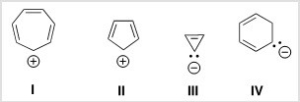
A)I
B)II
C)III
D)IV

A)I
B)II
C)III
D)IV

Unlock Deck
Unlock for access to all 47 flashcards in this deck.
Unlock Deck
k this deck
18
What is the IUPAC name of the following compound? 
A)1-Chloro-4-ethyl-3-propylbenzene
B)1-Chloro-4-ethyl-5-propylbenzene
C)4-Chloro-1-ethyl-2-propylbenzene
D)4-Chloro-2-propyltoluene

A)1-Chloro-4-ethyl-3-propylbenzene
B)1-Chloro-4-ethyl-5-propylbenzene
C)4-Chloro-1-ethyl-2-propylbenzene
D)4-Chloro-2-propyltoluene

Unlock Deck
Unlock for access to all 47 flashcards in this deck.
Unlock Deck
k this deck
19
Which of the following heterocycles is not aromatic? 
A)I
B)II
C)III
D)IV

A)I
B)II
C)III
D)IV

Unlock Deck
Unlock for access to all 47 flashcards in this deck.
Unlock Deck
k this deck
20
Which of the following is not one of the Hückel's criteria for aromaticity?
A)The molecule must be cyclic.
B)The molecule must be planar.
C)The molecule must be completely conjugated.
D)The molecule must have 4n pi electrons.
A)The molecule must be cyclic.
B)The molecule must be planar.
C)The molecule must be completely conjugated.
D)The molecule must have 4n pi electrons.

Unlock Deck
Unlock for access to all 47 flashcards in this deck.
Unlock Deck
k this deck
21
Why is the following compound not aromatic? 
A)It has 4n pi electrons.
B)It is not cyclic.
C)It has 4n+2 pi electrons.
D)The pi electron system is not continuous.

A)It has 4n pi electrons.
B)It is not cyclic.
C)It has 4n+2 pi electrons.
D)The pi electron system is not continuous.

Unlock Deck
Unlock for access to all 47 flashcards in this deck.
Unlock Deck
k this deck
22
Which of the following compounds is aromatic? 
A)I
B)II
C)III
D)IV

A)I
B)II
C)III
D)IV

Unlock Deck
Unlock for access to all 47 flashcards in this deck.
Unlock Deck
k this deck
23
What is the name of the following compound? 
A)2,6-Dimethylbenzene
B)5-Methyltoluene
C)Anisole
D)1,3-Dimethylbenzene

A)2,6-Dimethylbenzene
B)5-Methyltoluene
C)Anisole
D)1,3-Dimethylbenzene

Unlock Deck
Unlock for access to all 47 flashcards in this deck.
Unlock Deck
k this deck
24
Which of the following ions is aromatic? 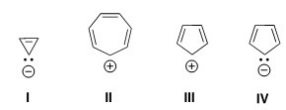
A)Only I and II
B)Only II and III
C)Only III and IV
D)Only II and IV

A)Only I and II
B)Only II and III
C)Only III and IV
D)Only II and IV

Unlock Deck
Unlock for access to all 47 flashcards in this deck.
Unlock Deck
k this deck
25
What compound is consistent with the following 1H NMR spectrum? 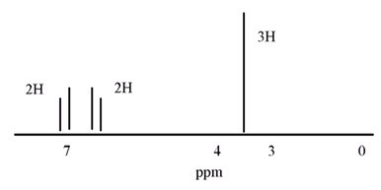
A)Phenol
B)Anisole
C)4-bromoanisole
D)4-bromotoluene

A)Phenol
B)Anisole
C)4-bromoanisole
D)4-bromotoluene

Unlock Deck
Unlock for access to all 47 flashcards in this deck.
Unlock Deck
k this deck
26
What is the correct structure for anisole? 
A)I
B)II
C)III
D)IV

A)I
B)II
C)III
D)IV

Unlock Deck
Unlock for access to all 47 flashcards in this deck.
Unlock Deck
k this deck
27
Why is the following compound not aromatic? 
A)It has 4n electrons.
B)It is not cyclic.
C)It has 4n+2 electrons.
D)The pi electron system is not continuous.

A)It has 4n electrons.
B)It is not cyclic.
C)It has 4n+2 electrons.
D)The pi electron system is not continuous.

Unlock Deck
Unlock for access to all 47 flashcards in this deck.
Unlock Deck
k this deck
28
What is the correct structure for para-bromotoluene? 
A)I
B)II
C)III
D)IV

A)I
B)II
C)III
D)IV

Unlock Deck
Unlock for access to all 47 flashcards in this deck.
Unlock Deck
k this deck
29
What is the name of the following compound? 
A)Meta-bromophenol
B)Para-hydroxybenzene
C)3-bromoanisole
D)6-methoxy-2-bromobenzene

A)Meta-bromophenol
B)Para-hydroxybenzene
C)3-bromoanisole
D)6-methoxy-2-bromobenzene

Unlock Deck
Unlock for access to all 47 flashcards in this deck.
Unlock Deck
k this deck
30
Which of the following compounds is not aromatic? 
A)I
B)II
C)III
D)IV

A)I
B)II
C)III
D)IV

Unlock Deck
Unlock for access to all 47 flashcards in this deck.
Unlock Deck
k this deck
31
What is the correct structure for 1-bromo-2,4-dimethoxybenzene? 
A)I
B)II
C)III
D)IV

A)I
B)II
C)III
D)IV

Unlock Deck
Unlock for access to all 47 flashcards in this deck.
Unlock Deck
k this deck
32
What orbitals are used to form the indicated bond? 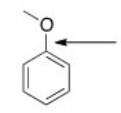
A)sp3
B)sp2
C)p
D)sp3 and sp2

A)sp3
B)sp2
C)p
D)sp3 and sp2

Unlock Deck
Unlock for access to all 47 flashcards in this deck.
Unlock Deck
k this deck
33
Which of the following statements about the molecular orbital (MO)theory is true? 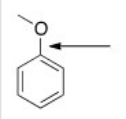
A)When two p orbitals of similar phase overlap side-by-side,a p* antibonding molecular orbital is formed.
B)When two p orbitals of opposite phase overlap side-by-side,a p bonding molecular orbital is formed.
C)A p bonding molecular orbital is higher in energy than the two atomic p orbitals from which it is formed.
D)A p* antibonding molecular orbital is higher in energy than the two atomic p orbitals from which it is formed.

A)When two p orbitals of similar phase overlap side-by-side,a p* antibonding molecular orbital is formed.
B)When two p orbitals of opposite phase overlap side-by-side,a p bonding molecular orbital is formed.
C)A p bonding molecular orbital is higher in energy than the two atomic p orbitals from which it is formed.
D)A p* antibonding molecular orbital is higher in energy than the two atomic p orbitals from which it is formed.

Unlock Deck
Unlock for access to all 47 flashcards in this deck.
Unlock Deck
k this deck
34
How many different proton signals would the following compound show in its 1H NMR spectrum? 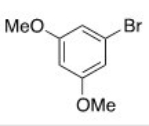
A)1
B)3
C)5
D)6

A)1
B)3
C)5
D)6

Unlock Deck
Unlock for access to all 47 flashcards in this deck.
Unlock Deck
k this deck
35
Which of the following compounds is not aromatic? 
A)I
B)II
C)III
D)IV

A)I
B)II
C)III
D)IV

Unlock Deck
Unlock for access to all 47 flashcards in this deck.
Unlock Deck
k this deck
36
Which of the following compounds is aromatic? 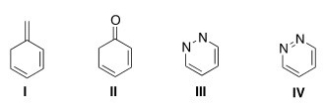
A)I
B)II
C)III
D)IV

A)I
B)II
C)III
D)IV

Unlock Deck
Unlock for access to all 47 flashcards in this deck.
Unlock Deck
k this deck
37
Where do the protons in benzene appear in the 1H NMR spectrum?
A)Around 1600 cm-1
B)Around 120 ppm
C)Around 0 ppm
D)Around 7 ppm
A)Around 1600 cm-1
B)Around 120 ppm
C)Around 0 ppm
D)Around 7 ppm

Unlock Deck
Unlock for access to all 47 flashcards in this deck.
Unlock Deck
k this deck
38
What orbitals are used to form the indicated bond? 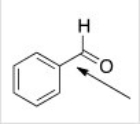
A)sp3
B)sp2
C)p
D)sp3 and sp2

A)sp3
B)sp2
C)p
D)sp3 and sp2

Unlock Deck
Unlock for access to all 47 flashcards in this deck.
Unlock Deck
k this deck
39
What is the correct structure for toluene? 
A)I
B)II
C)III
D)IV

A)I
B)II
C)III
D)IV

Unlock Deck
Unlock for access to all 47 flashcards in this deck.
Unlock Deck
k this deck
40
What is the correct structure for aniline? 
A)I
B)II
C)III
D)IV

A)I
B)II
C)III
D)IV

Unlock Deck
Unlock for access to all 47 flashcards in this deck.
Unlock Deck
k this deck
41
What is the IUPAC name of the following compound? 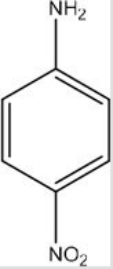
A)o-nitroaniline
B)m-nitroaniline
C)p-nitroaniline
D)4-nitroanilsole

A)o-nitroaniline
B)m-nitroaniline
C)p-nitroaniline
D)4-nitroanilsole

Unlock Deck
Unlock for access to all 47 flashcards in this deck.
Unlock Deck
k this deck
42
What is the IUPAC name of the following compound? 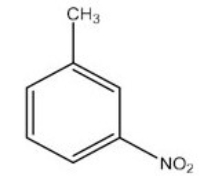
A)o-nitrotoluene
B)m-nitrotoluene
C)p-nitrotoluene
D)3-nitroanisole

A)o-nitrotoluene
B)m-nitrotoluene
C)p-nitrotoluene
D)3-nitroanisole

Unlock Deck
Unlock for access to all 47 flashcards in this deck.
Unlock Deck
k this deck
43
In what type of orbital does the lone pair on the indicated N atom reside? 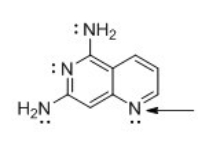
A)p
B)sp
C)sp2
D)sp3

A)p
B)sp
C)sp2
D)sp3

Unlock Deck
Unlock for access to all 47 flashcards in this deck.
Unlock Deck
k this deck
44
What is the hybridization of the indicated N atom in the following compound? 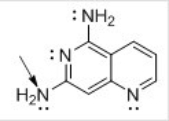
A)p
B)sp
C)sp2
D)sp3

A)p
B)sp
C)sp2
D)sp3

Unlock Deck
Unlock for access to all 47 flashcards in this deck.
Unlock Deck
k this deck
45
What is the hybridization of the indicated N atom in the following compound? 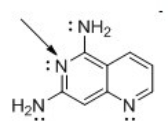
A)p
B)sp
C)sp2
D)sp3

A)p
B)sp
C)sp2
D)sp3

Unlock Deck
Unlock for access to all 47 flashcards in this deck.
Unlock Deck
k this deck
46
What is the IUPAC name of the following compound? 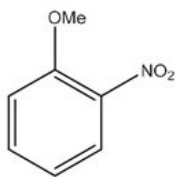
A)o-nitroanisole
B)m-nitroanisole
C)p-nitroanisole
D)2-nitroaniline

A)o-nitroanisole
B)m-nitroanisole
C)p-nitroanisole
D)2-nitroaniline

Unlock Deck
Unlock for access to all 47 flashcards in this deck.
Unlock Deck
k this deck
47
In what type of orbital does the lone pair on the indicated N atom reside? 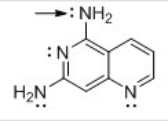
A)p
B)sp
C)sp2
D)sp3

A)p
B)sp
C)sp2
D)sp3

Unlock Deck
Unlock for access to all 47 flashcards in this deck.
Unlock Deck
k this deck



